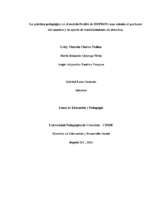La práctica pedagógica en el modelo flexible de IDIPRON : una mirada al quehacer del maestro y su aporte al restablecimiento de derechos.
Citación
Fecha
2021Autor
Tautiva Vergara, Angie Alejandra
Quiroga Nivia, David Eduardo
Chávez Molina, Leidy Marcela
Director / Asesor / Tutor
Lara Guzmán, Gabriel Antonio
Palabras claves
Práctica pedagógica
Discurso pedagógico
Subjetividad
Acciones pedagógicas
Experiencia
Escenario pedagógico
Keyword
Pedagogical practicePedagogical discourse
Subjectivity
Pedagogical actions
Experience
Pedagogical scenario
Metadatos
Mostrar el registro completo del ítemResumen
La presente investigación busca analizar y comprender como se configuran la práctica pedagógica de maestros que hicieron parte de las casas de acogida y cuidado en el modelo flexible de IDIPRON y cómo estas se relacionan con el restablecimiento de derechos. Las prácticas pedagógicas generalmente se refieren a la metodología donde existen procedimiento teóricos y prácticos que regulan la interacción, la comunicación, el ejercicio del pensamiento, acciones, tiempo, en espacios escolares, buscando reconocer la práctica pedagógica no solo como acción y reflexión sino transformación a partir de la reflexión.
Los propósitos de la investigación se centran en analizar la relación entre el discurso
pedagógico y la subjetividad del maestro en la construcción de la práctica pedagógica; al tiempo que explica el significado de las acciones pedagógicas que utilizan los maestros de las casas de acogida y cuidado y como estas se relacionan con el restablecimiento de derechos, así mismo analiza la relación e incidencia entre escenario pedagógico y la práctica pedagógica.
El enfoque metodológico utilizado en esta investigación fueron las historias de vida, las cuales permitieron recopilar experiencias y vivencias de cinco maestros en relación al desarrollo de su práctica pedagógica y las demás categorías planteadas, para la compilación de la información se utilizo el instrumento de entrevista semiestructurada formulando tres entrevistas a cada maestro.
Por lo anterior el documento está estructurado en cinco capítulos, el primero hace referencia a el planteamiento del problema, justificación y objetivos de la investigación; el segundo capítulo esta compuesto de el estado del arte y el marco teórico; el tercer capítulo da cuenta del enfoque metodológico de la investigación y una contextualización del lugar en el que se desarrollo la tesis; el cuarto capítulo se enfoca en el análisis de resultados de acuerdo a los datos obtenidos y el quinto capítulo presenta los hallazgos.
Finalmente, esta investigación busca visibilizar y reivindicar al maestro como sujeto de reflexión desde su práctica pedagógica, en la relación maestro alumno y comprenderla desde su contexto y con ella su posible vínculo con el restablecimiento de derechos de los NNAJ. Evidenciando la práctica pedagógica como un lugar relevante de investigación que aporta conocimiento a la educación y pedagogía.
Abstract
This research seeks to analyze and understand how the pedagogical practices of teachers who were part of the foster and care homes in IDIPRON's flexible model are configured and how they relate to the restoration of rights. Pedagogical practices generally refer to the methodology where there are theoretical and practical procedures that regulate interaction, communication, the exercise of thought, actions, time, in school spaces, seeking to recognize the pedagogical practice not only as action and reflection but transformation from reflection.
The purposes of the research are focused on analyzing the relationship between pedagogical discourse and subjectivity.
The purposes of the research focus on analyzing the relationship between the pedagogical discourse and the teacher's subjectivity in the construction of the pedagogical practice; while explaining the meaning of the pedagogical actions used by the teachers of the shelters and care homes and how these are related to the restoration of rights, as well as analyzing the relationship and incidence between the pedagogical scenario and the pedagogical practice.
The methodological approach used in this research were the life stories, which allowed the collection of experiences and experiences of five teachers in relation to the development of their pedagogical practice and the other categories proposed, for the compilation of the information the semi-structured interview instrument was used, formulating three interviews to each teacher.
Therefore, the document is structured in five chapters, the first one refers to the problem statement, justification and objectives of the research; the second chapter is composed of the state of the art and the theoretical framework; the third chapter gives account of the methodological approach of the research and a contextualization of the place where the thesis was developed; the fourth chapter focuses on the analysis of results according to the data obtained and the fifth chapter presents the findings.
Finally, this research seeks to make visible and vindicate the teacher as a subject of reflection from his pedagogical practice, in the teacher-student relationship and to understand it from its context and with it its possible link with the restoration of rights of children and youth. Evidencing the pedagogical practice as a relevant place of research that contributes knowledge to education and pedagogy.
Editorial
Universidad Pedagógica Nacional
Programa académico
Maestría en Desarrollo Educativo y Social (CINDE-UPN)

